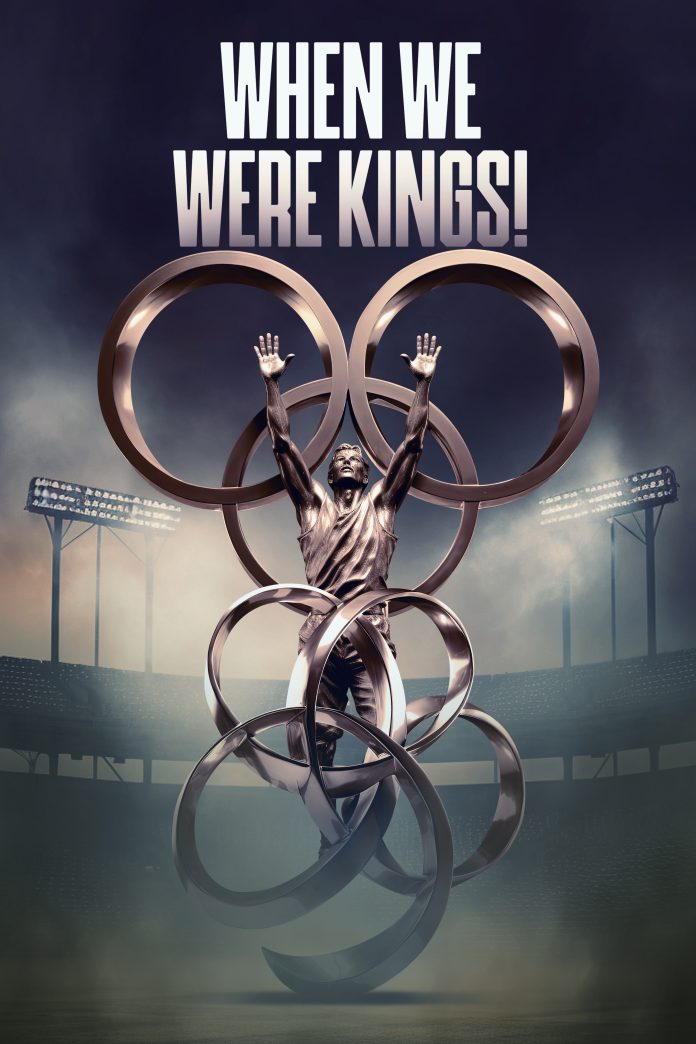In Pakistan, if you are not into Sports, you are labelled as a social outcast since Sports is important to everyone in the country. There was a time when not winning was a headline in the country since the men in green were busy winning laurels for their countrymen and making a name for themselves at the same time. However, Pakistan’s superiority in Cricket, Hockey, and Squash seems to be on hiatus, but the sportsmen of the past have done enough to keep the current generation motivated. Let’s take a look at their exploits from the days when we were kings and relive some of those glory days so that the youngsters could get motivated, and, to them, the future might seem brighter and less bleak for a change.
Cricket – The game where Pakistan ruled the world!
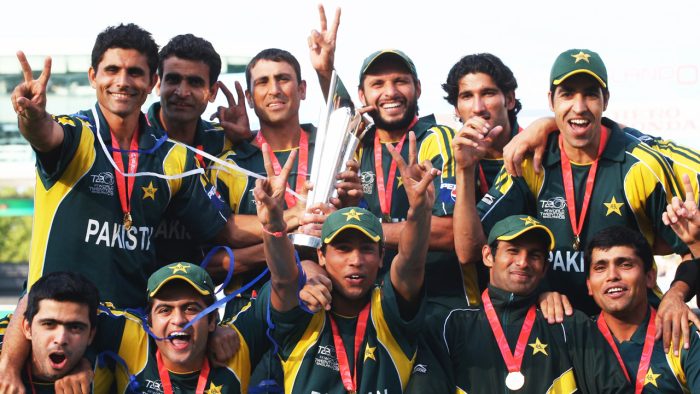
Cricket became Pakistan’s most passionately followed sport in the mid-80s after Javed Miandad hit the last ball for a six against India in the first Austral Asia Cup. Before that, Pakistan was winning matches but not stamping their authority at the international level. Yes, under the guidance of the first Pakistani skipper Abdul Hafeez Kardar, the team defeated, which debuted in 1952, won at least one Test against every opponent, including India, NZ, Australia, West Indies, and England. But it wasn’t until Javed Miandad hit Chetan Sharma of India for a last-ball six at Sharjah that things began to change rapidly for the fans of the green shirts.
Until the final of the first Austral Asia Cup held in April 1986, Pakistan had neither won the World Cup nor reached the final of the mega event. Their fortunes changed on 18th April 1986 when, needing four runs off the final ball, Miandad hit the ball out of the boundary to start a chain reaction that has been delivering since. The next year, Pakistan won the historic Test series against India, which was followed by the Nehru Cup in the same country two years later when Wasim Akram hit a penultimate ball six off Vivian Richards to make Pakistan champions of the six-team event.
Despite qualifying for the semi-final of the World Cup three times before the 1992 World Cup, Pakistan was on its way out when the event was held for the first time Down Under. However, with the likes of Javed Miandad and Ramiz Raja in form and Imran Khan at the helm, Pakistan managed to become World Champions of the 50-over World Cup for the first time.
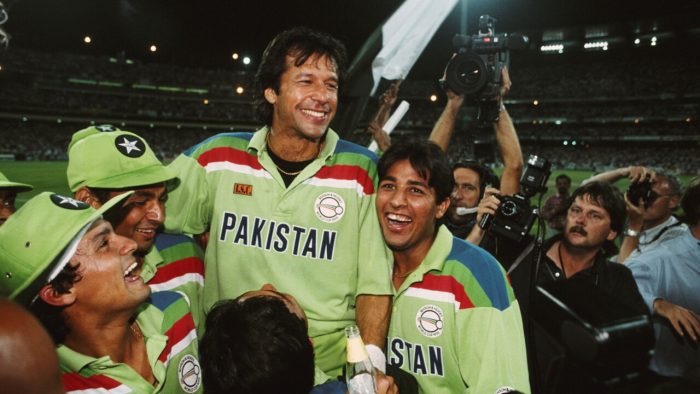
After that, they won the World Series played in Australia in 1997 under Wasim Akram, as well as the first Asian Test Championship three years later.
One tournament that eluded Pakistan – Asia Cup – was also won in 2000 under Moin Khan’s Captaincy and that made many forget the heartbreak of the World Cup final in 1999, where Australia stunned the men in green to clinch the trophy. Under Younis Khan’s leadership, Pakistan staged a comeback at the international level and won the second T20 World Cup in 2009, which was Pakistan’s second appearance in the final of the newly-introduced format.
The second time Pakistan won the Asia Cup was in 2012 under Misbah-ul-Haq’s captaincy and that triumph remains etched in people’s memory because it was a closely fought grand finale against Bangladesh in Bangladesh. Pakistan was back to winning ways five years later when the country shocked the world by defeating India in the final of the ICC Champions Trophy under Sarfaraz Ahmed’s captaincy. It was the last time Pakistan won any trophy at the international level, but it seems under the new management, they might have a chance to add a title to their shelf this year.
Misbah ul Haq remains the only Pakistani captain to lead the side that went on to win the Test Mace, handed over to the best time of the year, whereas they had won the now defunct Sharjah Cups and Sahara Cups on countless occasions as well. One must also mention that Pakistan’s Saeed Anwar and Aaqib Javed also held the world record for the most runs in an innings (194 runs) and best bowling analysis in an ODI (7 wickets for 37 runs), respectively, for more than a decade. What made their performances memorable was the fact that arch-rivals India was on the receiving end on both occasions – 1991 at Sharjah in the case of Aaqib Javed and 1997 at Chennai in the case of Saeed Anwar.
Hockey – The bar men-in-green set is still unmatchable
Long before Cricket took over Pakistan as the unofficial ‘national game’, it was Hockey which ruled the hearts and minds of the entire country. From the Olympic Games to the World Cup, from the Champions Trophy to the Asia Cup, the men in green were either always in contention or came home with the trophy. For years, the hockey team remained the sole hope for a gold medal in the Summer Olympics, which they achieved for the first time after the country celebrated its 13th Independence Day. After that, there was no turning back for the national team, which continued to win accolades for the country and asserted their dominance over the sport, at least for the next forty years.
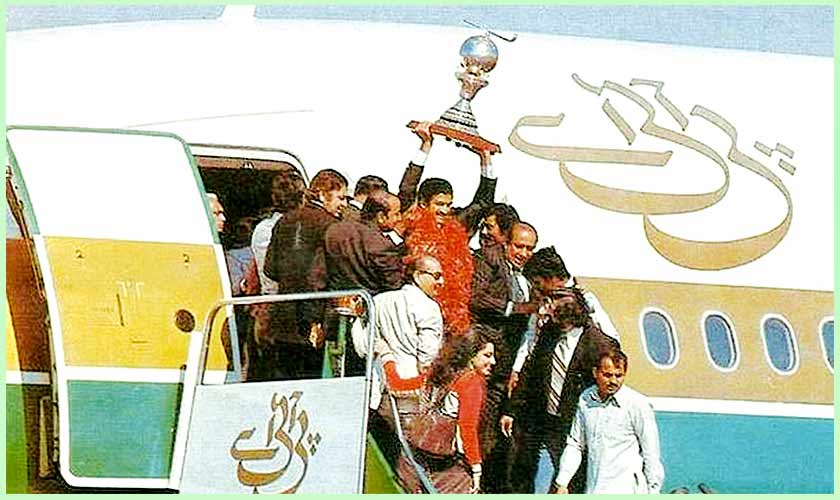
Thanks to the many great hockey players who represented Pakistan at the international level, the Pakistan hockey team managed to reach the podium at the Olympics on eight occasions, winning the gold medal in 1960, 1968, and 1984, whereas they ended up as runners-up in 1956, 1964 and 1972. The green shirts managed to end up in third place in 1976 and 1992, and since then, haven’t reached the podium despite trying hard at times.
While their Olympic record isn’t the best in terms of number of medals, they remain the only side to become World Champions on four occasions. Since winning the inaugural World Cup in 1971, they have reclaimed the trophy on three more occasions, still one more than second-placed Netherlands, Germany, and Australia, who have three titles apiece. Pakistan reclaimed the trophy in 1978 and defended it well four years later, whereas they were crowned champions for the last time in 1994 under the guidance of Shahbaz Ahmed Sr.
Similarly, the Champions Trophy used to be a tournament where Pakistan reached the podium more often than others. Unlike the Olympics, where every country with a team could participate, and the World Cup, where the better teams played, the Champions Trophy was reserved for the top teams and Pakistan’s three victories came in three different decades, making it all the more memorable. Their first Champions Trophy triumph came in 1978, whereas the second time they won the tournament was in 1980, and after a gap of 14 years, Pakistan was crowned the Champion of the Champions Trophy for the third and so far, the last time in 1994. They won the silver as well as the bronze medal at the event on seven occasions, each making it the most successful tournament for the Pakistan hockey team.
Currently, Pakistan hockey stands nowhere at the international level, and that has to do more with the lack of infrastructure, the change in formats, and the careless approach of those at the helm, but there was a time when Pakistan regularly won the Sultan Azlan Shah Cup, the Asia Cup and even the Asian Games but sadly that seems like a thing from the past. One hopes that in the coming days, the younger minds get at work and devise a strategy that helps Pakistan regain its lost glory and make a comeback just like they did on countless occasions on the field.
Squash – When Going for Gold was a hobby!
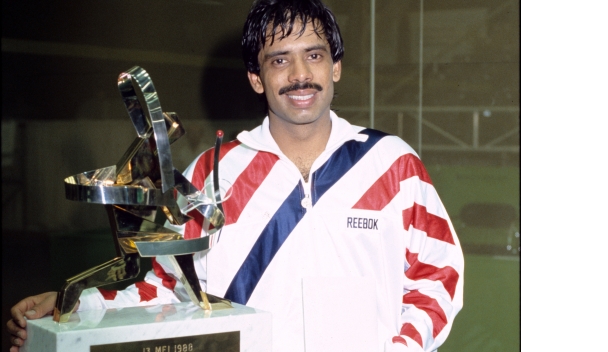
While Pakistani sportsmen were trying to make a name for themselves in the international arena in Cricket and Hockey, Hashim Khan was pioneering a legacy that would keep on delivering for the next fifty years. It was in 1951 that he managed to become the British Open Champion for the first time, and despite being in his late 30s at that time, he dominated the championship for the next decade, losing just once in the next seven years, that too in the final.
After Hashim Khan, his relatives Roshan Khan (the only person to beat him in a British Open final), Azam Khan and Mohibullah Khan kept the flag flying high at the British Open, the most prestigious squash tournament of the year. However, between 1964 and 1981, only one Pakistani Qamar Zaman managed to win the tournament, despite Aftab Jawaid, Gogi Alauddin, and Qamar Zaman’s handful of appearances in the final. That all changed in 1982 when a youngster named Jahangir Khan became the British Open champion and dominated the game for the next nine years. He never lost a match until he bowed out in 1991, and that was when his successor, Jansher Khan, took over and continued the winning ways till he lost the final to Peter Nicol of Scotland in 1998.
While Jahangir reached the final of the British Open 11 times, he won a record 10 titles consecutively, while Hashim Khan and Jansher Khan followed him with 7 and 6 titles, respectively. Although Pakistan hasn’t been prolific in Squash since Jansher Khan’s retirement, the Khan legacy has continued to impress those who get to read about it.
After all, no sportsman has managed to win as many as 555 consecutive matches in any sport, and the record held by Jahangir Khan remains the longest winning streak by any athlete in professional sport. In addition to the British Open, Jahangir and Jansher Khan managed to win as many as 14 finals at the World Open, which was introduced in the late 1970s. Here, Jansher Khan won more titles (8) than his fellow countrymen (6), and no Pakistani had managed to win the event since 1996, when Jansher Khan lifted it for the eighth time in Karachi.
Enter the cueists, athletes, and Aisam!
In 1994, Pakistan was one of the few countries in the world that held as many as four World titles in as many sports – Cricket, Hockey, Squash, and Snooker. Had it not been for cueist Mohammad Yousuf’s brilliance, the game would not have survived and revived in the country where youngsters thronged to snooker clubs in their free time.

Since Mohammad Yousuf’s victory in the final of the Amateur Snooker Championship in 1994, Saleh Mohammad and Mohammad Sajjad have reached the finals of the event, while Mohammad Asif has managed to reclaim the World Championship twice, once in 2012 and once in 2019. The last time Pakistan won the event was in 2021 when 16-year-old Ahsan Ramazan became the 2nd youngest player to be crowned the Amateur snooker champion in the world, after Chinese player Yan Bingtao, who won the event at the age of 14.
Pakistan might not be a front-runner when it comes to athletics, boxing, and tennis, but don’t be surprised if you discover that Pakistan won two bronze medals at the Olympic level in sports that aren’t typically associated with Pakistan. The first bronze medal that Pakistan won in the 1960 Olympic Games was in Wrestling when Mohammad Bashir ended at the podium of the freestyle welterweight category, while 38 years later, Syed Hussain Shah won the same in Boxing, making every Pakistani proud. Since then, athletes from the country have won laurels for the country at the international level, with Arshad Nadeem being the latest to join the club as a javelin thrower.
And finally, something about the lone star of Pakistan sports in the last two decades – Aisam-ul-Haq, who might not have won a Grand Slam for his country but made everyone feel proud when he and his partners – India’s Rohan Bopanna and Czech Republic’s Kveta Peshcke, ended up as runners up at the US Open in 2010. He reached the mixed doubles final and the men’s doubles final at the event in the same year, and although he lost both finals, he won the hearts of all by delivering a speech that should be taught in every school. Even after crossing 40, he is still active at the international level and inspiring young Pakistanis to take up sports and follow their dream.

